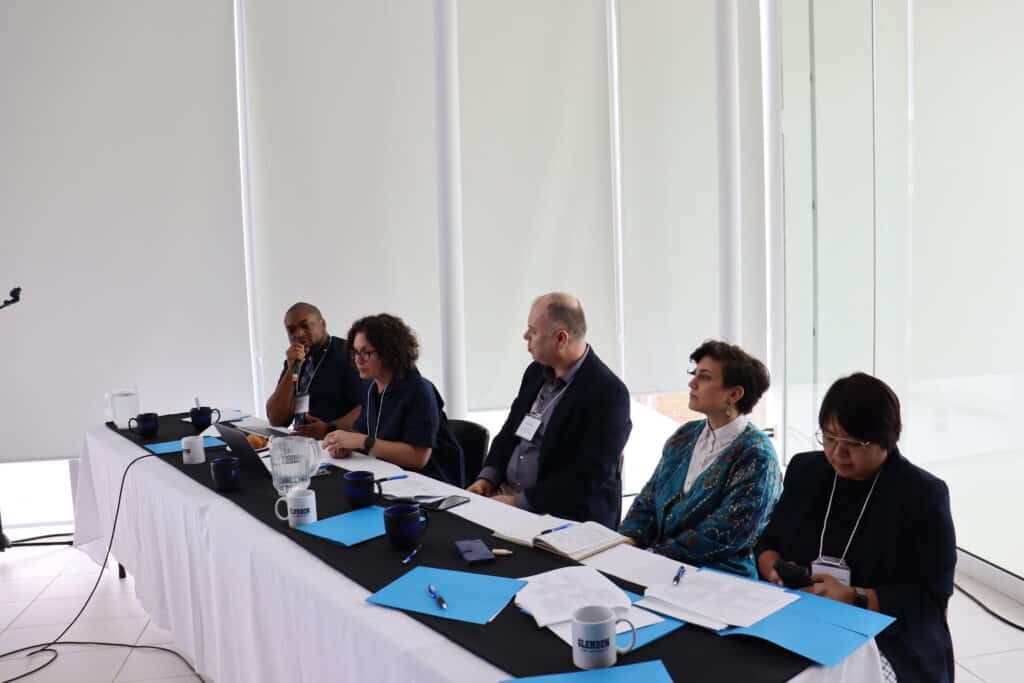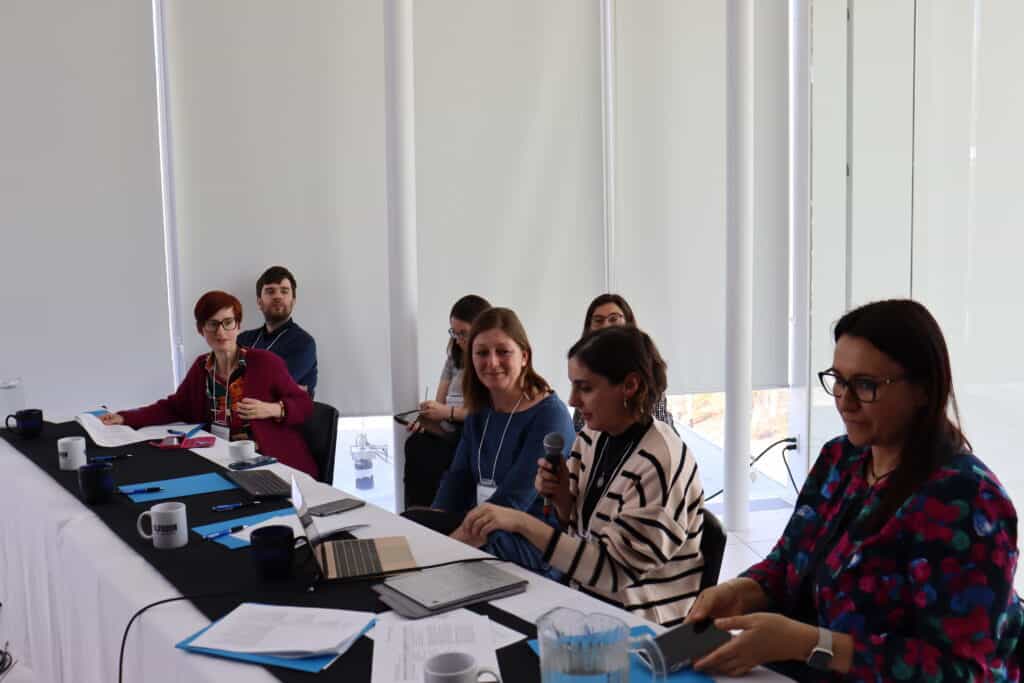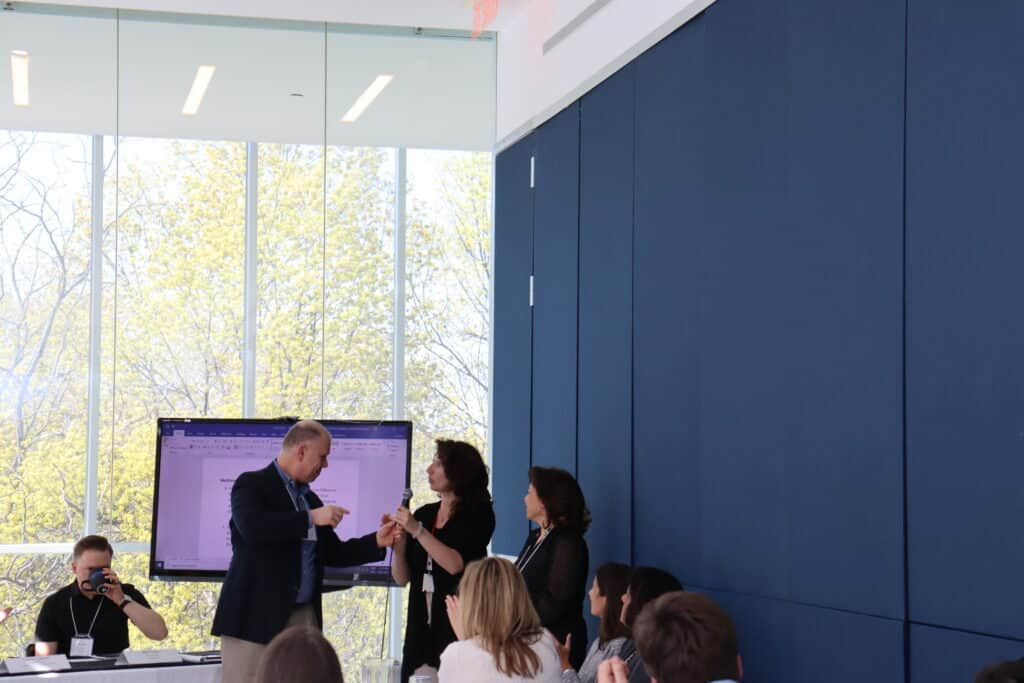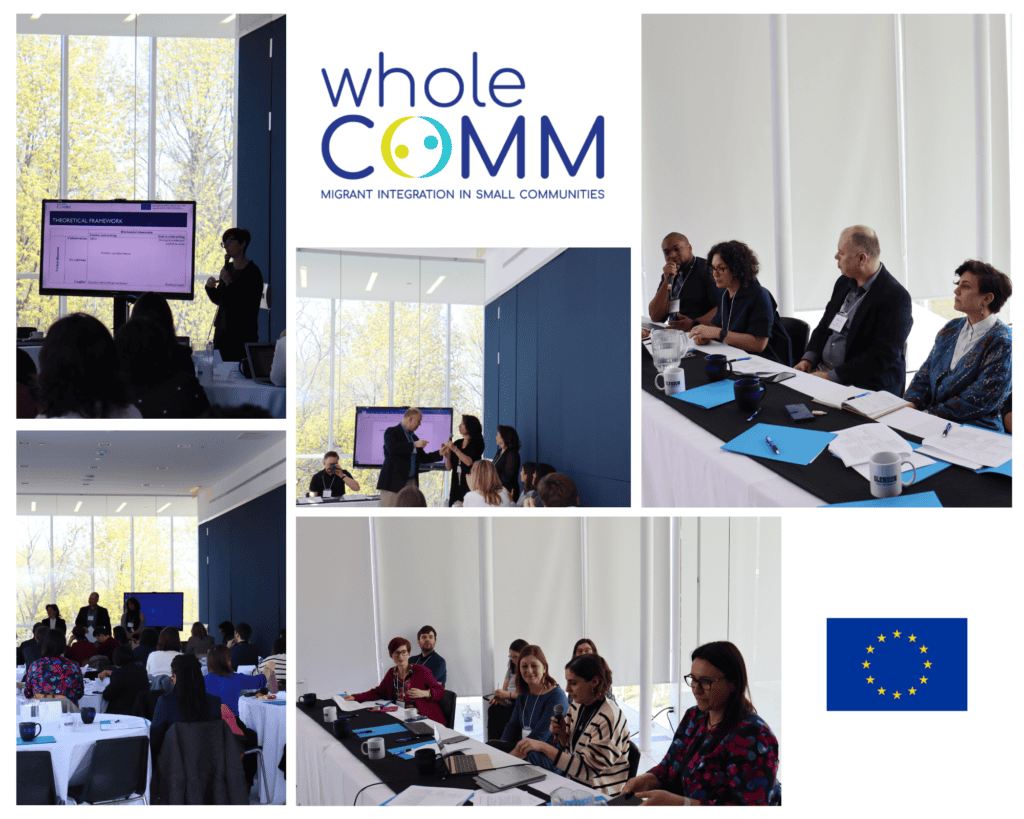Article written by Kathryn Barber, Ph.D. candidate (ABD) in Sociology at York University
The TransAtlantic CommunityPolicy-LAB was held at York University’s scenic Glendon campus in mid-town Toronto, Canada on April 26 and 27, 2023. A Whole-COMM knowledge dissemination event, the LAB was also partially funded by a prestigious Canadian Social Science and Humanities Research Council (SSHRC) Outreach grant. It had three major goals: 1) Expand academic and policy knowledge about migrant integration in SMsTRAs; 2) Advance academic cross-comparative knowledge and theorization on the key dynamics and mechanisms that shape the relationship between migrant integration policy and community cohesion or fragmentation, and; 3) Collaboratively innovate cross-comparative policy best practices for migrant integration in SMsTRAs.
Distinguished Participants at the TransAtlantic CommunityPolicy-LAB
The event successfully brought together an accomplished group of academics, policymakers and community service organizations (CSOs) from both sides of the Atlantic – all with an active interest in understanding the integration experiences of migrants in SMsTRAs. Academic participants from the Whole-COMM project represented a range of European institutions and countries, including: Tiziana Caponio, Andrea Pettrachin (CCA), Sinem Yilmaz (MPG), Birgit Glorius (TUC), Anna Faustmann (DUK), Elina Jonitz (EUR), Patrycja Matusz (UWr) and Mans Lundstedt (MAU). Canadian and American academics from universities located in both urban and smaller centres were present: Michael Jones-Correa (UPenn), Abigail Fisher Williamson (CT), Carlos Jose Teixeira (UBC Okanagan), Natalya Brown (Nipissing) , Melissa Kelly (TMU), Gabriela Novotna (USask), Sohail Shahidnia (TMU), Uzma Danish (TU), Shirin Khayambashi (BUSU), Tony Fang (MAU), Bree Akesson (WLU), Karen Frensch (WLU), Monika Thakur (YorkU), Blair Cullen (TU), Rana Telfah (U of G), Ame Khin May-Kyawt (UBC), Jasmin Habib (WLU), Willem Maas (YorkU), Maissaa Almustafa (YorkU) and Kathryn Barber (YorkU).
A variety of policymakers, CSO and city representatives were also in attendance: Raïs Kibonge (Deputy Mayor, Sherbrooke, QC), Mohini Singh (City Councillor, Kelowna, BC), Kathy Vassilakos (Former City Councillor Stratford, ON), Rouka Abdoulaiye (Immigration Development Officer, Sherbrooke, QC), Maria Grazia Montella (CEMR), Niken Astari Carpenter (City of Eerie, PA), Sharmin Khundkar (City of Eerie, PA), Kasie Foulk (City of Jamestown, NY), Leigha Horsfield (Community Futures North Okanagan, BC) and Monica Abdelkader (Association for New Canadians, NFLD). Finally, the conference benefitted from the organizational assistance of three wonderful York undergraduate students – Aaron Ramos-Cortes, Natalia Tovilla-Batiz and Kieryn Maloney – as well as the excellent administrative support of Prisca Ng How Tseung and Sandra-Maria Dibo-Amaney.


Structured Sessions at the Policy-LAB: A Collaborative Approach
Each day of the Policy-LAB sessions was structured around four sessions: a Whole-COMM session, CSO and policymaker presentations, an academic working session and, finally, a roundtable. The Whole-COMM sessions described the project to the international audience and theorized its findings. As an example, in “Neither multilevel governance nor battleground: Understanding/making sense of the politics of refugees’ integration governance in small localities in Europe”, Tiziana Caponio (CCA) theorized the cumulative findings of the project. Likewise, Birgit Glorius (TUC) expanded on the unique dynamics of local integration in Germany in her presentation entitled, “The power of local narratives: How demographic and historic conditions impact approaches towards refugee integration in small and medium-sized towns and rural areas (SMsTRAs) in Germany”.
CSO and Policymaker Sessions: Integration Challenges and Best Practices
The CSO and policymaker sessions invited representatives to describe integration challenges and best practices in their respective cities. Kasie Foulk (Immigration Coordinator, City of Jamestown, US), for example, described lack of identification for asylum seekers, legal prohibitions on work and distrust of authority structures as challenges to successful integration in her presentation on “Immigration in the city of Jamestown”. Conversely, Raïs Kibonge (Deputy Mayor, Sherbrooke QC) examined integration best practices through his discussion of the positive contributions that formal local migrant integration and anti-racism policies could play in “Sherbrooke city: An overview of general immigration and integration dynamics”.
Academic Working Paper Session: Refugee and Immigration Integration in Canada.
The academic working paper session focused on refugee and immigration integration and settlement in the Canadian context. Presentations addressing refugee integration examined the experience of the Syrian cohort in different Canadian provinces – such as Tony Fang’s (MUN) “Exploring the new journey: A comparative study of settlement experiences between Syrian refugees and non-Syrian refugees in small Canadian communities”. The unique features of the Canadian refugee resettlement infrastructure were also addressed in presentations such as Blair Cullen’s (TU), “Welcoming communities, local immigration partnerships and municipalities: Where do non-traditional stakeholders in non-traditional settlement destinations fit in a new immigrant settlement landscape?”. Papers exploring immigrant integration focused on the multifaceted perspectives of the Canadian settlement experience. Themes included regional profiles, access to housing and social integration such as sport. Carlos Teixeira (UBC Okanagan), for instance, examined newcomer access to housing in “Settling a mid-size city in the interior of British Columbia: A case study of recent immigrants’ housing experiences in Kelowna (Central Okanagan)” while Melissa Kelly (TMU) provided a profile of settlement infrastructure in rural Saskatchewan (“How is settlement and integration different in rural areas? Evidence from the Canadian prairies”).
Roundtables: Promoting Cross-Sectoral Dialogue on Migrant Integration.
Finally, the roundtables promoted cross-sectoral dialogue by bringing together policymakers, academics and CSO representatives to reflect on cross-cutting issues such as the role of local government in migrant integration, the key factors influencing this process and the challenges/best practices that had been encountered.
The event was a success, yielding many dynamic conversations on the integration experiences of migrants in SMsTRAs. It fostered connections between academia, policymakers and CSOs that will certainly continue at other Whole-COMM knowledge dissemination events.






